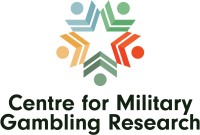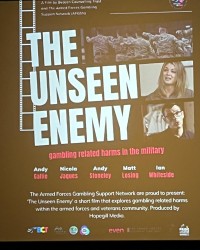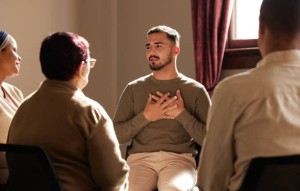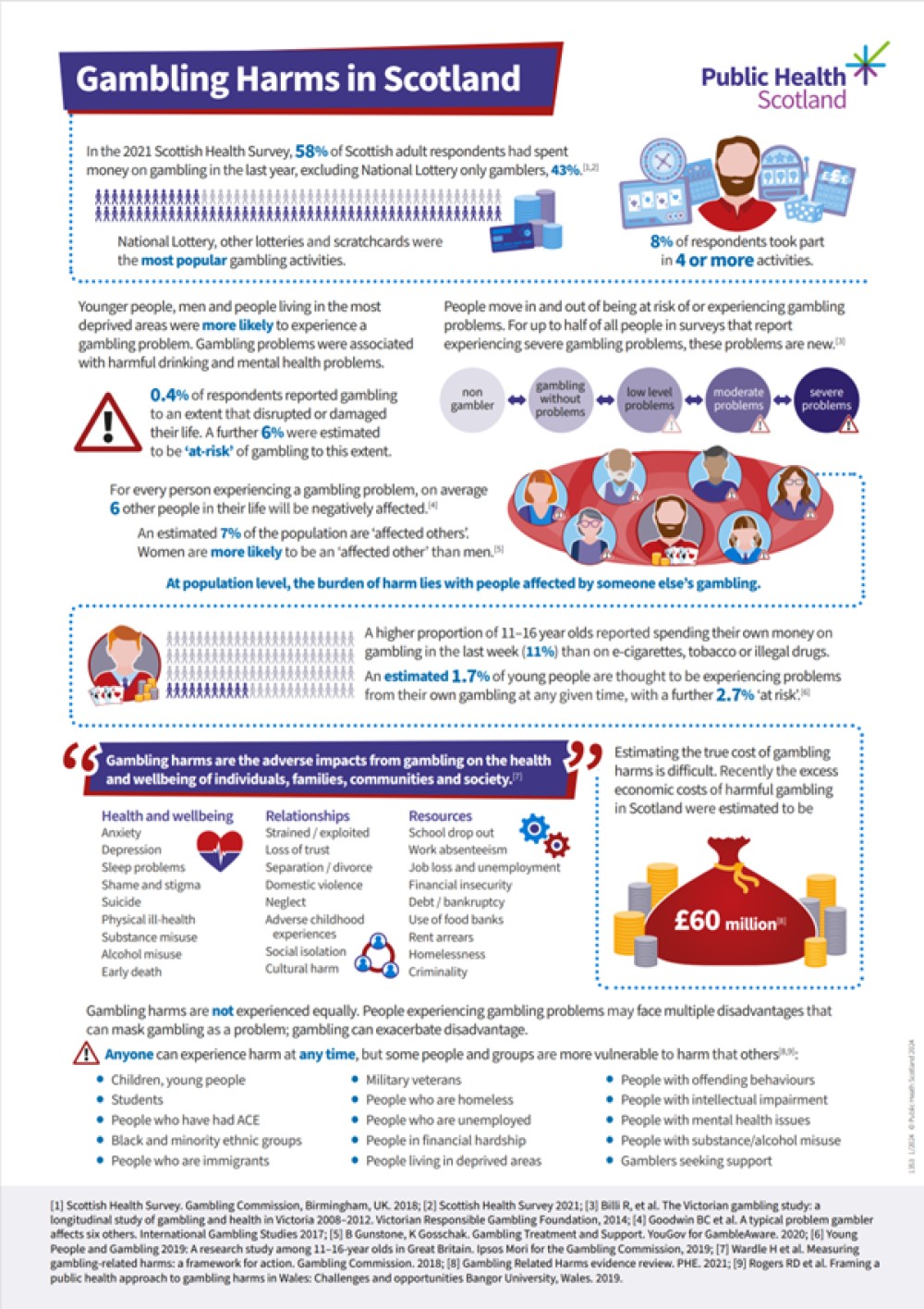Section 3 – Veterans and Finance: Gambling Harm
Policy, Research and Operational Context
The Gambling Survey for Great Britain (GSGB) collects official statistics for the Gambling Commission on gambling behaviour in Great Britain. This survey provides evidence on gambling behaviours and attitudes from across the country with insights on why people gamble, gambling participation and the impact gambling can have. The value of the gambling market in Great Britain was £15.6 billion in 2023/2024, with around 48% of adults taking part in some form of gambling activity each month. Examples of the most popular forms of gambling in the UK include:
- national lottery
- buying a lottery scratch card
- playing bingo
- placing a bet on a football match, a horse etc
- placing a bet in a casino
- online betting
Gambling can lead to significant negative impacts, including financial difficulties, mental health issues, relationship problems, and even legal troubles, affecting individuals, families, and communities. The impacts can be wide-ranging, but specifically in the area of finance and debt can include unmanageable levels of debt and sometimes bankruptcy, the loss of savings or assets, inability to pay household bills (including rent), job loss, and legal problems associated with debt.
 These impacts are also felt far beyond the individual. According to a 2020 report ‘Gambling and Treatment Support’ around 7% of the population of Great Britain (adults and children) were found to be negatively affected by someone else’s gambling. Affected others are more likely to be women and the most severe impacts of problem gambling were felt most by immediate family members. Almost half (48%) of people who were affected by a spouse or partner’s gambling reported a severe negative impact. This was followed by people affected by the gambling of a parent (41%) and the gambling of a child (38%).
These impacts are also felt far beyond the individual. According to a 2020 report ‘Gambling and Treatment Support’ around 7% of the population of Great Britain (adults and children) were found to be negatively affected by someone else’s gambling. Affected others are more likely to be women and the most severe impacts of problem gambling were felt most by immediate family members. Almost half (48%) of people who were affected by a spouse or partner’s gambling reported a severe negative impact. This was followed by people affected by the gambling of a parent (41%) and the gambling of a child (38%).
GambleAware has worked with Polimapper to produce maps which show gambling harm prevalence in each local authority area, as well as usage of and reported demand for treatment and support for gambling harms. While not veteran specific, these do provide helpful information on geographic patterns across the general population.
The challenges and impacts of gambling harms are gaining greater public awareness and recognition, with a growing range of actions and initiatives underway to reduce harms and support those affected. Within the serving armed forces and veteran community, gambling - particularly gambling-related harm - is becoming an area of increasing research and concern, although much of the work to date has been limited in scale.
King’s College London, through its King’s Centre for Military Health Research (KCMHR) and other research groups, conducts studies on the health and wellbeing of military personnel and veterans, including topics such as poor mental health, alcohol misuse, and gambling, with a focus on identifying and addressing gambling harms.
 The Centre for Military Gambling Research (MilGam) was formally established in May 2024, hosted at Swansea University with a range of partners and collaborators. The aim of MilGam is to coordinate and direct the growing body of research evidence on military gambling, to act as a training provider, and to advance evidence-based knowledge generation and dissemination.
The Centre for Military Gambling Research (MilGam) was formally established in May 2024, hosted at Swansea University with a range of partners and collaborators. The aim of MilGam is to coordinate and direct the growing body of research evidence on military gambling, to act as a training provider, and to advance evidence-based knowledge generation and dissemination.
Published in 2021, ‘The United Kingdom Armed Forces Veterans’ Health and Gambling Study’ provides a helpful insight into gambling, the causes of gambling and the distinctions of gambling activity between the veteran and non-veteran community. This study supports findings in previous work, including the 2007 ‘Gambling Problems in the UK Armed Forces Veterans: Preliminary Findings’ paper and the 2022 ‘Gambling and Wellbeing in the RAF’ study.
Although now 4 years old, some striking numbers indicate that of the sample, 43.1% of the veteran community reported harmful gambling, which is more than 10 times that of non-veterans. Veteran gambling was 7 times more likely to be motivated by the avoidance of stress. Some factors which may influence these concerning statistics include: access to disposable funds, attraction to risky or high adrenaline activities, isolation, and diversionary/avoidance behaviours. As this is a UK wide survey, there are no specific numbers available for Scotland, however, it is reasonable to assume that Scottish veterans are similarly impacted by gambling harms. It is worth noting that the sample selection requires the data to be treated with a degree of caution.
The importance of ensuring that gambling-specific interventions are person-centred, evidence-based, and integrated with established services supporting mental health and addiction was underscored in the National Centre for Social Research report “Understanding How Effective Interventions Are for Gambling Harm”. The report sets out several recommendations to strengthen the effectiveness of these interventions.
In England, the National Institute for Health and Care Excellence (NICE) published guidance earlier this year on ‘Gambling-related harms: identification, assessment and management’. They recommend providing easy access to treatment for people who may otherwise find it difficult to access services (such as people in military Service) and include armed forces personnel and veterans as a group who may be at increased risk of harm. No equivalent clinical guidelines are yet in place in Scotland, but this is under consideration.
 The UK Government confirmed in November 2024 that they would proceed with a statutory levy on gambling operators, administered by the Gambling Commission, to generate funding for the research, prevention and treatment of gambling harms. It is anticipated that this will raise around £100 million per year. 20% of the funds raised will be directed to UK Research and Innovation (UKRI) for oversight, with prevention funds (30%) to be directed to the Office for Health Improvement and Disparities (OHID), and treatment funds (50%) to be directed to NHS England and appropriate bodies in Scotland and Wales. That levy came into place on 6 April 2025 and the Scottish Government will receive a fair allocation for use to support treatment and prevention in the current financial year.
The UK Government confirmed in November 2024 that they would proceed with a statutory levy on gambling operators, administered by the Gambling Commission, to generate funding for the research, prevention and treatment of gambling harms. It is anticipated that this will raise around £100 million per year. 20% of the funds raised will be directed to UK Research and Innovation (UKRI) for oversight, with prevention funds (30%) to be directed to the Office for Health Improvement and Disparities (OHID), and treatment funds (50%) to be directed to NHS England and appropriate bodies in Scotland and Wales. That levy came into place on 6 April 2025 and the Scottish Government will receive a fair allocation for use to support treatment and prevention in the current financial year.
Gambling is reserved to the UK Government, however responsibilities for public health are devolved and since 2024 the Scottish Government and Public Health Scotland (PHS) have been taking forward a programme of work on gambling harms. This has included the development of a framework which will guide and support how the funding Scotland receives through the statutory levy allocation is used. PHS recognises gambling harm as a significant public health issue that exacerbates health inequalities, particularly affecting vulnerable populations. PHS has identified military veterans as a group that is at higher risk of gambling harm. In April of this year they published ‘A Healthcare needs Assessment on Gambling Harm’ and this will inform further work in this area.
Veterans have access to the range of statutory and third sector support in place for the general population. Data on armed forces or veteran status is not routinely collected, though may become known in the course of the support process.
Supported by the Armed Forces Covenant Trust the ‘Battling the Odds’ Armed Forces Gambling Harms Support Network operates in Scotland through the RCA Trust. It seeks to reduce the stigma of gambling harms across the armed forces community and, in doing so, encourage access to appropriate support. The ‘Battling the Odds’ programme works with service providers and those who may come in to contact with members of the armed forces or veterans experiencing (or at risk of experiencing) gambling harms to increase their knowledge and awareness. The programme equips learners to provide early interventions and refer individuals to specialist service provision.

GamCare provides the Armed Forces Project for serving personnel and those who lead, manage, train and support them.
Beacon Counselling Trust and The Armed Forces Gambling Support Network (AFGSN) have produced a very powerful short film ‘The Unseen Enemy’ that explores gambling related harms within the armed forces and veteran community. This collaborative production features contributions from veterans and ‘affected others’ with lived experience of gambling related harms and specialists from within the gambling harms support sector.
Testimony to the Commissioner
Everyone I spoke to was clear that prevention is the best approach to tackling gambling harms, intervening before these harms occur wherever possible. Most acknowledged that awareness and understanding levels have increased in recent years, but that there was more to be done.
I was told that gambling is something that veterans are reluctant to talk about, there remains considerable stigma and shame despite the increasing public discourse about the harms that can arise. Support organisations noted that there was a range of factors that might contribute to a greater risk or prevalence of gambling harms. These include the fact that ex-Service personnel may have a higher threshold for risk and risk taking behaviour, or may have developed gambling habits in Service due to known risk factors such as periods of boredom and solitude, high levels of disposable income, and use of free time.
For veterans, these factors might be extended to include disconnection from their military identity, the loss of camaraderie and belonging they might have had with their unit, relocation and transition to civilian life.
It was also suggested that traumatic events (at any time in life, including as a result of military Service) may be a factor in gambling behaviours and harm.
For every individual who suffers gambling harms, there is a negative impact for a high number of ‘affected individuals’, something in the range of 6 to 10 other people was suggested to me.
For those experiencing gambling harms, the impact can be highly individual. For example in terms of financial harm, a loss of £10 per week may have a significant impact on one person, while others might be able to lose much more without experiencing the same level of harm.
I learned that there was a range of actions individuals could take if they felt their gambling was having a negative impact. This includes, for example, early warning alerts from banks and putting ‘blocks’ on on-line gambling accounts. Staff who work in gambling establishments are trained to spot problem behaviours and try and provide interventions and support. These mitigations do, however, largely depend on proactivity on the part of the gambler.
Veterans can and will access mainstream gambling support and treatment programmes but they would probably not be asked if they have served in the armed forces so data on uptake and outcomes for this cohort is not collected. It was suggested that consideration should be given to routinely identifying veterans as this would allow for improved targeting, monitoring, and evaluation of the effectiveness of these services for veterans. This would need to be done in a way that did not create barriers to accessing support.
However, I learned that for some Serving personnel and veterans, being able to access services where they feel heard and understood is important to them. On that basis, specific ‘military’ programmes can be beneficial as well as mainstream programmes that are ‘veteran aware’.
 Peer support (in particular from those with lived experience) was noted as a very important and beneficial aspect of care and treatment, and it was suggested this is key to recovery. However, there were mixed views on what was meant by ‘peer’ with some suggesting that the peer needed to have served in the armed forces while others thought the peer should have experienced gambling harm.
Peer support (in particular from those with lived experience) was noted as a very important and beneficial aspect of care and treatment, and it was suggested this is key to recovery. However, there were mixed views on what was meant by ‘peer’ with some suggesting that the peer needed to have served in the armed forces while others thought the peer should have experienced gambling harm.
Some contributors noted that challenges around population spread, rurality and ability to travel meant that on-line and virtual support should be available in service provision.
Those who offer gambling awareness and support programmes welcomed the inclusion of armed forces personnel and veterans in the NICE guidelines, hoping this will support these groups to get the support they need. The gambling levy was also welcomed as an opportunity to extend and enhance support and treatment provision in Scotland.
More generally, most of the charities and service providers I spoke to do not routinely ask about gambling behaviours or harms. They noted that while alcohol or drug dependencies would be included in any needs assessment process, gambling does not feature in the same way. It was suggested to me that this should be addressed, given the increasing evidence and recognition of the impact of gambling harms.
What can be improved
Gambling and gambling-related harms are gaining increased public and policy attention. It is essential that policymakers, public services, support organisations, and others with an interest respond proactively to the challenges presented by gambling harms. More can - and must - be done to reduce stigma and to encourage those affected to seek help and access treatment.
Organisations supporting veterans should actively incorporate gambling into their needs assessments. They should be aware that military veterans are at higher risk of gambling harms and staff should have an awareness of gambling harms. Establishing clear referral pathways and building links with specialist support services is vital to ensure those affected receive timely advice and assistance.
Dedicated research specifically looking at Scottish veterans could be commissioned to provide more detailed insights into the unique cultural, economic, and social factors influencing gambling harm within this group, ensuring interventions are culturally and contextually appropriate for Scotland.
With the introduction of the new statutory levy, this is a pivotal moment in shaping the future of prevention and treatment services. The growing body of evidence highlights that veterans are at increased risk of gambling harms. As such, they should be clearly recognised as a priority group in the development of public health policy, services, and support systems related to gambling harms.
While the focus of this review is on veterans, it is clear from the research into gambling harms that prevention is better than cure. Establishing positive behaviours in Service would ensure that the veteran community is protected from the long-term effects of gambling addiction. The first step in this aspiration is removing stigma and providing education throughout military service.
Spotlight on Gambling Harms in Scotland
(Click image to enlarge)
Explore report
- Report home
- Veterans and Finance Foreword
- Introduction and Approach
- Section 1 – Veterans and Finance: Financial Landscape
- Section 2 – Veterans and Finance: Benefits and the Welfare System
- Section 3 – Veterans and Finance: Gambling Harm
- Section 4 – Veterans and Finance: Sectoral Employment
- Scottish Veterans Commissioner Recommendations




